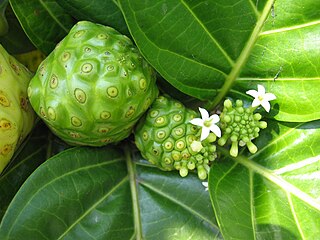Noni, also known as the Indian mulberry, beach mulberry, cheese fruit and hog apple, grows well in open coastal regions and up to 1000 metres above sea level. It thrives in all types of soil with good drainage, and is even tolerant against alkalinity and saline water. The tree can grow up to 10 m tall, and 12 months-old plants start producing fruits all year round. The fruit is a multiple fruit (syncarp) and is oval in shape, measuring 10-20 cm in size. Mature noni fruits have a pungent taste that many people will find repelling.
Southeast Asia possesses considerable variability of the wild tree and Polynesian migrants introduced the plant to Australia and India. In the Pacific Islands noni has been traditionally used as a famine food. Because of considerable interest in noni as a “nutraceutical” it has been introduced into many tropical countries in recent years.
Noni plants yield an average of 50 to 150 fruits per tree, or 5 to 15 kg per tree in the initial years of bearing and the yield increases as years pass on. The fruits are mainly processed into fruit drinks and nutritional supplements.
At the national symposia on noni research held in Hyderabad (2006), Chennai (2007), New Delhi (2008), Chennai (2009, 2010, 2011, 2012) and at the World Noni Congress in Chennai (2010) case studies have been presented on the health-promoting and therapeutical properties of noni. Major compounds like scopoletin, caprylic acid, vitamin C, terpenoids, alkaloids, anthraquinones, beta-sitosterol, carotenes, vitamin A, amino acids, and aucubin were isolated. Xeronine is a compound in noni juice believed to cause beneficial effects.
For more information on noni see: Peter PI, Peter KV. 2008. Monograph on Noni (Morinda citrifolia L.). World Noni Research Foundation, Chennai, India, 863 pp.
(Text contributed by Prof. Dr. P.I. Peter and Prof. Dr. K.V. Peter from World Noni Research Foundation, Chennai, India)
Noni fruit branch with ripe (far left) and unripe fruits (far right).
Noni fruits and flowers.



Nenhum comentário:
Postar um comentário